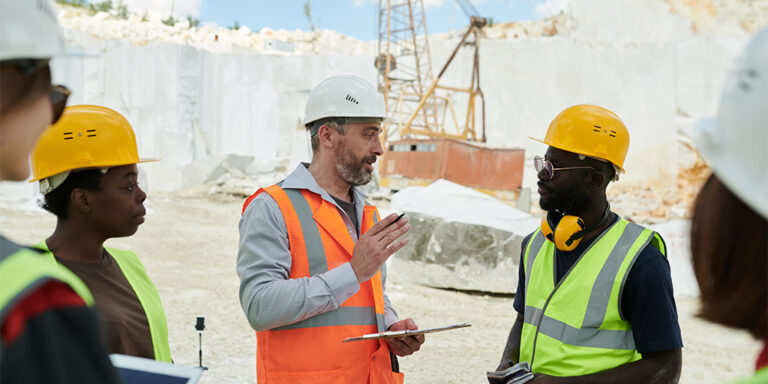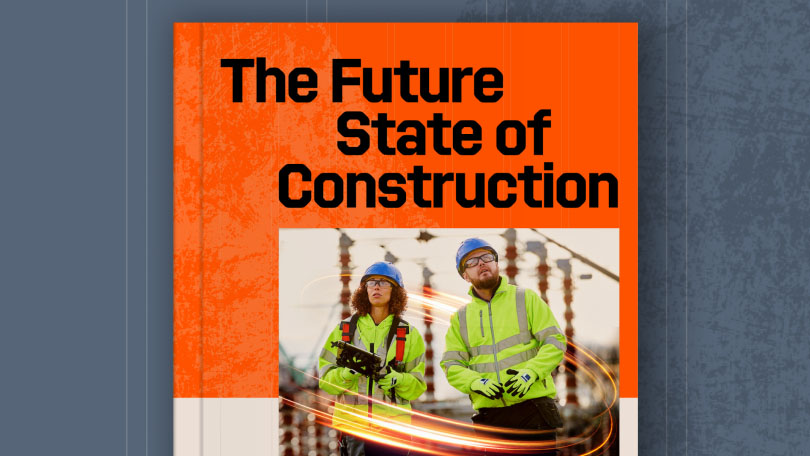— 4 min read
The Role of a Construction Project Manager

Last Updated Aug 28, 2025

Jordan Moran
Solutions Engineer
Jordan Moran, based in London, is a seasoned expert in construction management. Currently a Solution Engineer at Procore Technologies, he has held roles such as Project Manager at BEH Interiors and Assistant Project Manager at Pick Everard, with foundational experience at Morgan Sindall Construction. He holds a BS in Construction Engineering Management from Loughborough University and certifications including APM PFQ, Procore Project Manager, CITB CSCS Card + SMSTS. Jordan's expertise spans construction processes and project management.

Nicholas Dunbar
Content Manager
65 articles
Nick Dunbar oversees the creation and management of UK and Ireland educational content at Procore. Previously, he worked as a sustainability writer at the Building Research Establishment and served as a sustainability consultant within the built environment sector. Nick holds degrees in industrial sustainability and environmental sciences and lives in Camden, London.
Last Updated Aug 28, 2025

The construction project manager plays an important role in a construction project. They plan, organise and schedule all the activities on site. Without them, projects could get chaotic and off track. But it’s not just planning that construction project managers are responsible for. They’re kept busy with all sorts of tasks on site and in the office. We’ll explore those responsibilities throughout this article. Keep reading to learn about the roles and duties of a construction project manager, how the career has evolved and how it’s still changing today.
Table of contents
What is a construction project manager?
A construction project manager is the person that brings order to the busy environment of a construction site. They’re responsible for overseeing projects with three things at the top of their mind:
+ Health and safety
+ Planning schedule
+ Costs
They organise projects so that both the construction process and the finished build are safe and compliant with all health and safety regulations. They also make sure that the project is completed on time and on budget. How much it will cost and how long it will take are two of the most important factors for whether clients are happy with a project, so the construction project manager must focus on keeping them under control. A big part of their role is to make sure there are no major or unexpected changes that affect the budget or the timeline.
Learn about the future of the built environment - Read Procore's Future State of Construction report
Learn how contractors, subcontractors, and project teams can take advantage of new opportunities to boost efficiency and profitability over the next decade. Download the report to get your roadmap to the future state of construction.

Why is construction project management important?
Construction project management is essential for getting work done on time, on budget and safely. The construction project manager ensures that all of these areas are under control. They create the plan for construction projects, carry out vital quality and safety checks on site and monitor all aspects of project progress. They are also responsible for managing materials and workers — a task known as resource allocation — to make sure everyone has what they need. Construction project managers also need to solve problems and challenges when they arise, and manage risks.
A Day in the Life of a Construction Project Manager
Construction project managers split their time between the office and the site, and no two days look the same. Their day typically involves coordinating with architects, engineers, designers and other professionals to ensure that projects meet safety standards and all planned specifications. They also need to respond to situations and challenges throughout the workday. They help find ways for workers to adapt to unexpected changes. Here’s what a day in the life of a construction project manager could look like:
Daily Routine Breakdown
07:00 — Arrive on site and open up with the security team
07:15 — Catch up on emails over breakfast and a cup of tea
07:30 — Prepare for morning site briefing, check who is on site for the day
08:00 — Deliver the morning briefing
08:45 — Carry out site inspections and monitoring
09:30 — Head back to the office to carry out admin work, make phone calls, answer emails
10:00 — Update project schedules and timelines based on the morning inspection and material deliveries
11:30 — Meet with client to update them on project, scope and expectations
12:30 — Lunch
13:30 — Office admin, updating documentation, processing invoices
14:30 — Meet with subcontractors to review progress and discuss any challenges
15:30 — Meet with site supervisors to follow up on any issues from the day
16:00 — Budget and cost review, updating project finance data
17:00 — Review the day and plan priorities for tomorrow’s morning briefing
Construction Manager vs. Construction Project Manager
Although these terms sometimes overlap, there are some subtle differences:
- A Construction Manager typically focuses on supervising workers and handling daily field operations. Their oversight is heavily site-based.
- A Construction Project Manager has a broader scope, handling all aspects of planning, scheduling, budgeting, and stakeholder communication from start to finish.
In many organisations, they perform overlapping duties, but some companies make a clear distinction between these two roles.
Becoming a Construction Project Manager
Construction project management is a competitive career, but it’s a role that offers good job security, development opportunities and competitive pay. It can be a challenge to break into any competitive career, so let’s tackle some frequently asked questions from aspiring construction project managers.
Final Thoughts
The construction project manager plays a vital role by keeping everything organised and moving forward on site. They handle planning, scheduling, managing costs, and ensuring health and safety protocols. By coordinating everyone from subcontractors to architects, they help projects finish smoothly, on time, and within budget.
Categories:
Written by

Jordan Moran
Solutions Engineer | Procore
Jordan Moran, based in London, is a seasoned expert in construction management. Currently a Solution Engineer at Procore Technologies, he has held roles such as Project Manager at BEH Interiors and Assistant Project Manager at Pick Everard, with foundational experience at Morgan Sindall Construction. He holds a BS in Construction Engineering Management from Loughborough University and certifications including APM PFQ, Procore Project Manager, CITB CSCS Card + SMSTS. Jordan's expertise spans construction processes and project management.
View profileReviewed by

Nicholas Dunbar
Content Manager | Procore
65 articles
Nick Dunbar oversees the creation and management of UK and Ireland educational content at Procore. Previously, he worked as a sustainability writer at the Building Research Establishment and served as a sustainability consultant within the built environment sector. Nick holds degrees in industrial sustainability and environmental sciences and lives in Camden, London.
View profileExplore more helpful resources

Integrated Compliance: A Main Contractor’s Guide to ISO 9001, 14001, 45001, and 44001
For UK main contractors, ISO 9001, 14001, and 45001 are fundamental prerequisites to any tendering activity. The Building Safety Act, Net Zero targets, and tight margins mean these certifications are...

The Main Contractor’s Action Plan for Commercial Risk
For UK main contractors, managing risk protects project margins, rather than solely acting as a compliance exercise. Construction is an industry defined by thin profits and high liability, and a...

Construction Action Plans: Minimising Risk & Maximising Delivery
A construction project is a complex set of tasks, resources, and stakeholders. Without a clear, documented path forward, even meticulous planning can lead to delays, cost overruns, and disputes. The...

Construction Drawings: Guide to Types & Regulations
While architects, urban planners and landscape designers first conceive buildings and public realms in their minds, translating vision into detailed drawings remains the foundation for any project. Construction drawings translate...
